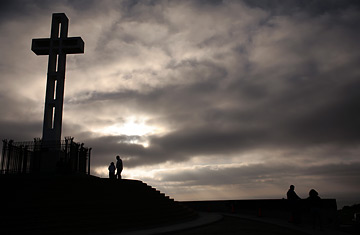
A 43-ft cross stands at the Mt. Soledad Veterans Memorial in San Diego.
(8 of 8)
This theological approach is not without scriptural roots. A God who writes straight with crooked lines in human history is highly Biblical in outlook. The quest for God in the depths of experience echoes Jesus' words to his Apostles, "The kingdom of God is within you." And the idea of God's anonymous presence suggests Matthew's account of the Last Judgment, when Jesus will separate the nations, telling those on his right: "I was hungry and you gave me food, I was thirsty and you gave me drink." But when? they ask. "And the King will answer them, Truly, I say to you, as you did it to one of the least of these my brethren, you did it to me.' "
The theological conviction that God is acting anonymously in human history is not likely to turn many atheists toward him. Secular man may be anxious, but he is also convinced that anxiety can be explained away. As always, faith is something of an irrational leap in the dark, a gift of God. And unlike in earlier centuries, there is no way today for churches to threaten or compel men to face that leap; after Dachau's mass sadism and Hiroshima's instant death, there are all too many real possibilities of hell on earth.
The new approaches to the problem of God, then, will have their greatest impact within the church community. They may help shore up the faith of many believers and, possibly, weaken that of others. They may also lead to a more realistic, and somewhat more abstract, conception of God. "God will be seen as the order in which life takes on meaning, as being, as the source of creativity," suggests Langdon Gilkey. "The old-fashioned personal God who merely judges, gives grace and speaks to us in prayer, is, after all, a pretty feeble God." Gilkey does not deny the omnipotence of God, nor undervalue personal language about God as a means of prayer and worship. But he argues that Christianity must go on escaping from its too-strictly anthropomorphic past, and still needs to learn that talk of God is largely symbolic.
No More Infallibilities.
The new quest for God, which respects no church boundaries, should also contribute to ecumenism. "These changes make many of the old disputes seem pointless, or at least secondary," says Jesuit Theologian Avery Dulles. The churches, moreover, will also have to accept the empiricism of the modern outlook and become more secular themselves, recognizing that God is not the property of the church, and is acting in history as he wills, in encounters for which man is forever unprepared.
To some, this suggests that the church might well need to take a position of reverent agnosticism regarding some doctrines that it had previously proclaimed with excessive conviction.
Many of the theologians attempting to work out a new doctrine of God admit that they are uncertain as to the impact of their ultimate findings on other Christian truths; but they agree that such God-related issues as personal salvation in the afterlife and immortality will need considerable re-study. But Christian history allows the possibility of development in doctrine, and even an admission of ignorance in the face of the divine mystery is part of tradition. St. Thomas Aquinas declared that "we cannot know what God is, but rather what he is not."
Gabriel Vahanian suggests that there may well be no true faith without a measure of doubt, and thus contemporary Christian worry about God could be a necessary and healthy antidote to centuries in which faith was too con fident and sure. Perhaps today, the Christian can do no better than echo the prayer of the worried father who pleaded with Christ to heal his spirit-possessed son: "I believe; help my unbelief."
*Principally Thomas J. J. Altizer of Emory University, William Hamilton of Colgate Rochester Divinity School, and Paul Van Buren of Temple University. Satirizing the basic premise of their new non-theology, the Methodist student magazine motive recently ran an obituary of God in newspaper style: "ATLANTA, Ga., Nov. 9—God, creator of the universe, principal deity of the world's Jews, ultimate reality of Christians, and most eminent of all divinities, died late yesterday during major surgery undertaken to correct a massive diminishing influence. "Reaction from the world's great and from the man in the street was uniformly incredulous . . . From Independence, Mo., former President Harry S. Truman, who received the news in his Kansas City barbershop, said 'I'm always sorry to hear somebody is dead. It's a damn shame." *Almost impossible to translate, the name Yahweh means roughly "I am who I am" or "He causes to be." *Probably the most famous proofs for God's existence are the five ways of St. Thomas Aquinas, all drawn from the nature of the universe, that he sets out in his Summa Theologiae. Aquinas' first proof, for example, is that certain things in the world are seen to be in a state of motion or change. But something cannot be changed or moved except by another, and yet there cannot be an infinite series of movers. Therefore, there must be a first, or prime mover that is not moved or changed by anything else—and this is God.
